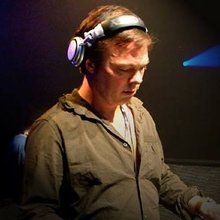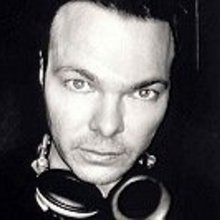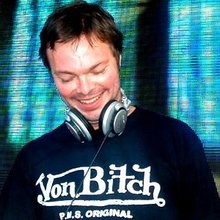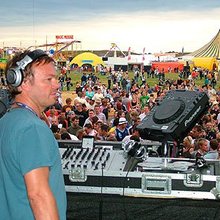PETE TONG is Britain’ best-loved dance DJ. He doesn’t need an award to prove his popularity and he won’t act cool to keep his credibility. The host of Radio 1’ ground-breaking Essential Selection show for a staggering eight years, he works within the mainstream, but is respected by the underground.
Born in Dartford, educated in Rochester and inspired in his teens by the underground soul scene of the late seventies (and the music of the time…by the likes of Funkadelic, James Brown & Evelyn “Champagne” King) Pete’ first DJ job was at a wedding. He was 15 years old. A natural born entrepreneur, he began promoting local bands, booking gigs in a nearby town hall and – as part of the Kent ‘Soul Mafia’ – playing black soul & dance music in every club that would give him a gig. After leaving school, he bought a Transit van and set up his own sound system.
In 1979, Pete became a journalist for monthly magazine Blues & Soul. By the following year, he was features editor, a position he would hold until ‘83. At the same time, he was appearing on local radio stations such as BBC Radio Medway and London. Then he got his first break with Radio 1, presenting a regular 15 minute ’magazine’ feature on dance music on Peter Powell’ show. “That was a strange experience, but also very exciting,” says Pete. “Radio 1 was at the peak of its popularity. I had to say what was happening on the streets. I was the first person to play Malcolm McLaren’ Buffalo Gals on the radio.”
Pete’ knowledge of the dance underground, coupled with his ear for a crossover hit, saw him appointed A&R manager at newly-founded independent label London Records in ‘83. While looking after the careers of pop acts like ’80s girl group Bananarama, he continued to pursue his budding radio career. Put off daytime shows by the discovery that the DJs didn’t pick their own playlists, Pete accepted his own programme on Kent’ newly-launched Invicta station in ’84. Influenced by radio DJ heroes such as Robbie Vincent, Greg Edwards and Emperor Rosko, he hosted a soul show there for three years, before briefly returning to Radio London. Almost immediately, however, he was poached by Capital Radio, where his weekly dance programme became cult listening with London clubbers.
In ’88, in the wake of Acid House, Pete launched his own record label, FFRR, through London Records. His aim was to both embrace the new wave of electronic music flooding into the country from cities such as Detroit and Chicago, and continue to promote his first love, black dance artists. “The first record I put out was a very cool, quite sexually-explicit single from Chicago called Baby Wants To Ride,” he recalls. “I had a rule which was to sign one relatively-indulgent record to every potential big hit. I was aware from the start that you can be hip, but you also have to balance the books.”
Inevitably, Pete managed to do both, simultaneously. FFRR’ next releases were cut’n’paste production ‘Bass (How Low Can You Go?)’ by Simon Harris and Salt’n’Pepa’ ‘Push It’, both cool club tracks which went on to storm the charts. They were followed by a stream of influential hits from signings such as Steve ‘Silk’ Hurley, D Mob, Smith & Mighty, Cookie Crew, L’il Louis The Brand New Heavies, Orbital and, of course, Goldie.
In ‘91, with an indigenous club culture now thriving in cities across the UK, Pete quit Capital Radio to go national. His Essential Selection show every Friday evening instantly established itself as a welcome to the weekend for a new generation of young clubbers. Heavy on house, but with room for the best breaking techno, jungle, hip hop, funk and soul sounds from both Britain and around the world, it appealed to all tastes in contemporary dance music. Moreover, it merged the cutting-edge with the mainstream. Pete became the country’ best-known dance DJ, while keeping his credibility intact. “I’m not too concerned with credibility,” he claims. “When I started out, I was obsessed by jazz-funk and soul. I couldn’t see life beyond the end of a Donald Byrd album. I was prepared to punch anyone who tried to talk to me about other types of music. But I grew up and discovered that I love hearing new sounds and having my perceptions changed. I didn’t want to be pigeon-holed. I also realised that I could achieve much more by staying on the edge of several scenes, rather than being immersed in just the one.”
Perhaps Pete’ biggest contribution to British pop to date was his involvement in the reshaping of BBC Radio 1. When the nation’ biggest radio station decided to re-invent itself in the mid-‘90s, controller Matthew Bannister knew precisely who to ask for help. After Pete’ ideas were taken on board, the likes of Tim Westwood, Danny Rampling, Judge Jules, Carl Cox and, more recently, Fabio and Grooverider, started to appear on Radio 1’ DJ roster. In addition, the station’ daytime playlist began to reflect the extent of the impact of modern electronic music on British kids. In January ‘99, Pete enters his eighth year as the presenter of Essential Selection. With over a million and a half listeners each week, it remains the UK’ most popular dance music radio show, thanks to its host’ consistent ability to change with the times. Its success has also spawned a series of compilation albums, released by FFRR, which to date have sold over 750,000 copies. The latest – which boasts a tangerine-themed cover and the mixing talents of Tong, Paul Oakenfold and, if you’re lucky enough to bag a limited edition copy with a bonus CD, Carl Cox – comes complete with Madonna’ seal of approval. It is the first time ever that the singer has sanctioned the appearance of one of her songs (Drowned World) on a dance mix compilation.
During ‘98, Pete made his first forays into television, an area he is keen to explore. In November, he donned different guises to present Clublife, a 90-minute, BBC-broadcast documentary based on Mixmag magazine’ annual dance awards. However, when he does appear with his own TV programme, it won’t be for want of publicity. In the past, he has turned down offers to present Radio 1’ high-profile breakfast and Top 40 shows, not to mention Top Of The Pops.
In the meantime, Pete has plenty on his plate. He is a director of Wise Buddah, the production company which makes radio programmes presented by Danny Rampling, Seb Fontiane and Judge Jules and continues to work in A&R for London Records. His pop star credentials include A&R-ing Shakespeare Sister’ hit Stay, which topped the charts for six weeks in ’92, and played a big role in signing All Saints, whose career he continues to oversee. He was recently musical director on films, Human Traffic and The Beach.
The year 2000 proved to be a milestone for Pete – he toured the US for the first time which saw queues around the block, he played on the terrace at Space in Ibiza for the first time, he played in Cape Town and Johannesburg and hosted his own float at Radio 1’ ‘Love Parade’ – “standing on my float with Jon Carter and Darren Emerson in front of 250,000 Radio 1 listeners was just the best feeling ever – a real moment in history”.
2001 is proving to be an equally exciting year for Pete with another tour of the States starting in March and his first tour of South America scheduled for later in the year.
Keeping his feet on the ground in the UK, Pete continues to be a valuable part of the British club scene with regular gigs scheduled at Tribal Sessions at Sankey Soap in Manchester, Code in Birmingham and many other credible commitments. He still remains a key figure at the UK summer festivals including for the first time a performance at T-In The Park as well as his yearly appointment at Creamfields and Homelands (Foot and mouth permitting).
Pete’ Radio 1 show “The Essential Selection” is now the most listened to radio show on the internet attracting a global audience of over 12 million.




